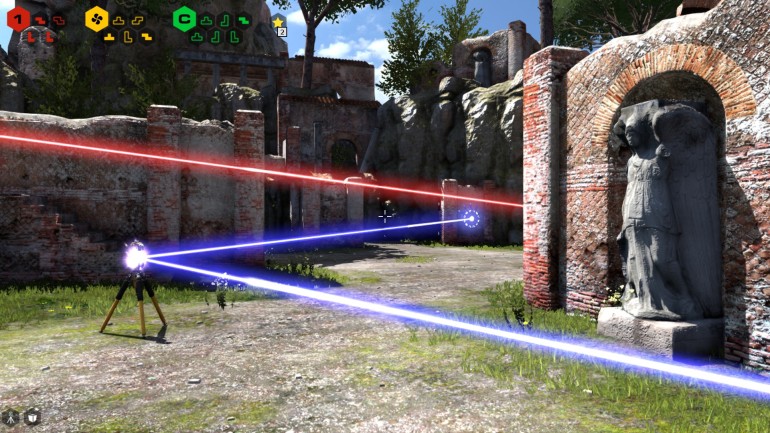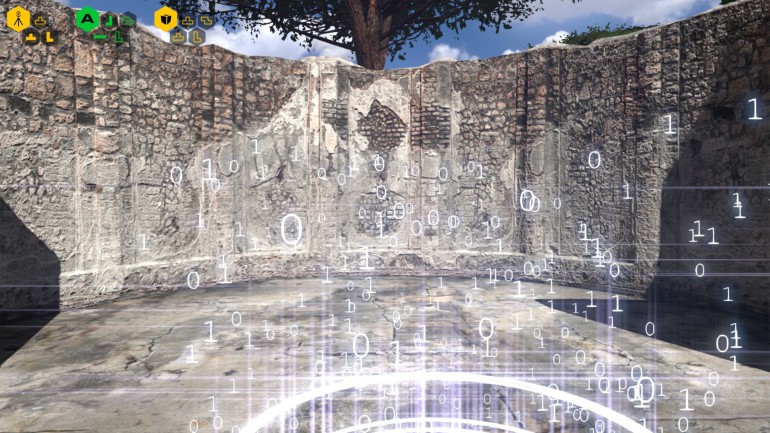The folks at Valve have said on a few different occasions that, when they first started working on Portal 2, they assumed it would be released into a crowded field of games in the same genre, that genre being—what, exactly?
Croteam calls The Talos Principe “a philosophical first-person puzzle game,” as though providing a pretty convincing answer to the question of what genre Portal belongs to, and also confidently emerging from an alternate reality where that genre is an established and expected one, a known quantity—a reality where some guy with tousled hair gets up on stage at the Video Game Awards and says, And the award for Best Philosophical First-Person Puzzle Game goes to…
In that world, it’s easy to imagine The Talos Principle winning that award. Which means that in our world, wherein we could probably count the number of commercially released “philosophical first-person puzzle games” on one hand, The Talos Principle is a rare pleasure and a considerable accomplishment.

Like Portal, The Talos Principle comes from a team known for (and runs in an engine originally built for) first-person shooters. But whereas Valve’s Half-Life games had a “thinking man’s shooter” ethos from which Portal emerged, Croteam’s Serious Sam games have always been wildly, gorgeously, unapologetically dumb, full of bravado and giving precisely zero fucks whether they end up on anybody’s game studies syllabus.
This makes The Talos Principle something of a surprise move for Croteam, since it announces itself early and often as a Big Important Game Of Big Important Ideas. (Will we be quoting Immanuel Kant at length? You bet your means and ends we will). The game offers nothing less than a meditation on the nature of personhood, the legacy that humankind might leave behind, and the strange machinations of a hypothetical robot religion.
Yet in its sanguine, erudite way, The Talos Principle trumpets that Here is a videogame, and here are the fucking remarkable things that videogames can do, just as loudly as Serious Sam does. It has the same undilluted enthusiasm and mad self-assurance, but applied to thoughtful rumination rather than, say, screaming headless humanoids with bombs for hands running at you forever.
That, and Croteam’s longstanding aesthetic preoccupation with antiquity has definitely followed them to this new project. (Will we be going to some version of Ancient Egypt? You bet your pyramids and hieroglyphs we will). The game has a genuinely haunting visual style, with lasers and spherical beep-booping hoverdrones ambling through natural landscapes and ruined ancient buildings that are near-photorealistic but ever-so-slightly and oh-so-purposefully off.
This serves the practical purpose of drawing a contrast between what players can interact with (the futuretech) and what they generally can’t (the ruins). But more importantly, it reinforces the sense that the philosophical questions at play are timeless ones, layering possible futures on top of misremembered pasts.

Here’s where I repeat my mantra/admonition for games this utterly special: as Davey Wreden said about The Stanley Parable, “it’s actually best if you don’t know anything about it before you play it. : D”. As ever, those are words (and an emoticon) to live by.
So I’m not going to talk in detail about anything that you wouldn’t know from (thoroughly) playing The Talos Principle Public Test (which, incidentally, is the best demo since The Stanley Parable Demonstration) and the additional pre-release freebie, Sigils of Elohim.
If you play the demo, you’ll see that the puzzles are all about cutting artificial paths through semi-organic spaces—looking at a lush garden and thinking of it in terms of limited resources and straight lines. This is clear enough with directed beams of laser-light and threat-disabling Jammers, but it’s true of every element. The puzzles involving powered fans seem fiddly and imprecise until you picture the air currents moving in orderly, mathy, absolutely straight lines.
And some of the late puzzles—don’t worry; no specifics—ask you to perform, to move around physically, in an orderly and predictable way, and also to anticipate the reactions of sometimes-unhelpful automatons—managing their quirks, telling them what you need non-verbally, wrangling them when they’re inclined to get caught in a loop and get in your way.
In other words, the game is pointedly teaching you to think in a way that is not quite the way humans naturally think, and also not quite the way a machine thinks (or “thinks”), but somewhere in between. Neither, and also both.

The rest of the game’s carefully balanced ecosystem of ideas derives from Jonas Kyratzes and Tom Jubert’s omnipresent script, which fills the game with words in about the same way that our own day-to-day world is filled with words—overflowing, overwhelming, addictive, organized, disorganized text-as-stuff, littering the landscape in the form of graffiti, QR codes, emails, blog posts, chatlogs, lecture notes, and corrupted chunks of books both real and imagined.
And of course, there are audiologs to find, fleshing out the backstory and hinting at the stakes of the decisions you’ll have to make. And there’s Elohim, watching over you like an Old Testament GLaDOS. And there’s a game-spanning, text-only dialogue tree with the Milton Library Assistant, a remarkable creation that simultaneously plays the roles of an unhelpful chatbot, Satan, and your drunk friend trying with increasing desperation to convince you that nothing exists.
This probably shouldn’t all hang together quite as well as it does, but there’s an irresistible momentum and charisma at play that makes the whole experience entrancing, compulsive, and eerily resonant. (If you want to know what’s in the intellectual water for game developers right now, by the way, then you could start by comparing The Process in The Talos Principle to The Process in Transistor).

There are most likely three endings, aligned with the three major Lands you visit in the game and the three bundles of themes that they represent: Faith, Death, and—something a little more elusive. Self-determination? Behavioral ethics? The vital and treacherous intersection of the two?
My reading is incomplete, because that probably-last ending is locked away until I track down the remainder of the game’s well-hidden optional collectibles, which require you to find alternate solutions to the core conundrums and (again, this is true even in the demo) cleverly smuggle supplies out of the puzzle rooms and back into the hub worlds. This will take me a while. I’m in some trouble here.
But I’m in no hurry. These deep secrets do an excellent job of making me want to linger in the Garden of Worlds for a good long while (and if you’ve played the game or the demo, you know just how equivocal and complicated and melancholy the idea of lingering in the Garden is). As someone who’s played every single philosophical first-person puzzle game under the sun, I can tell you that The Talos Principle is a stunning entry into that apparently-a-genre. It’s a huge, meaty endeavor of grand vision, lunatic ambition, polish, and composure.
Someday, when we’re able to talk without irony about the canon of philosophical first-person puzzle games, I suspect we’ll cite The Talos Principle as one of the works that shaped that canon. If you play games, it’s worth your time because there’s nothing else remotely like it—and if you’re interested in where games are going, then this one suggests a beyond-enticing possible future for the medium.